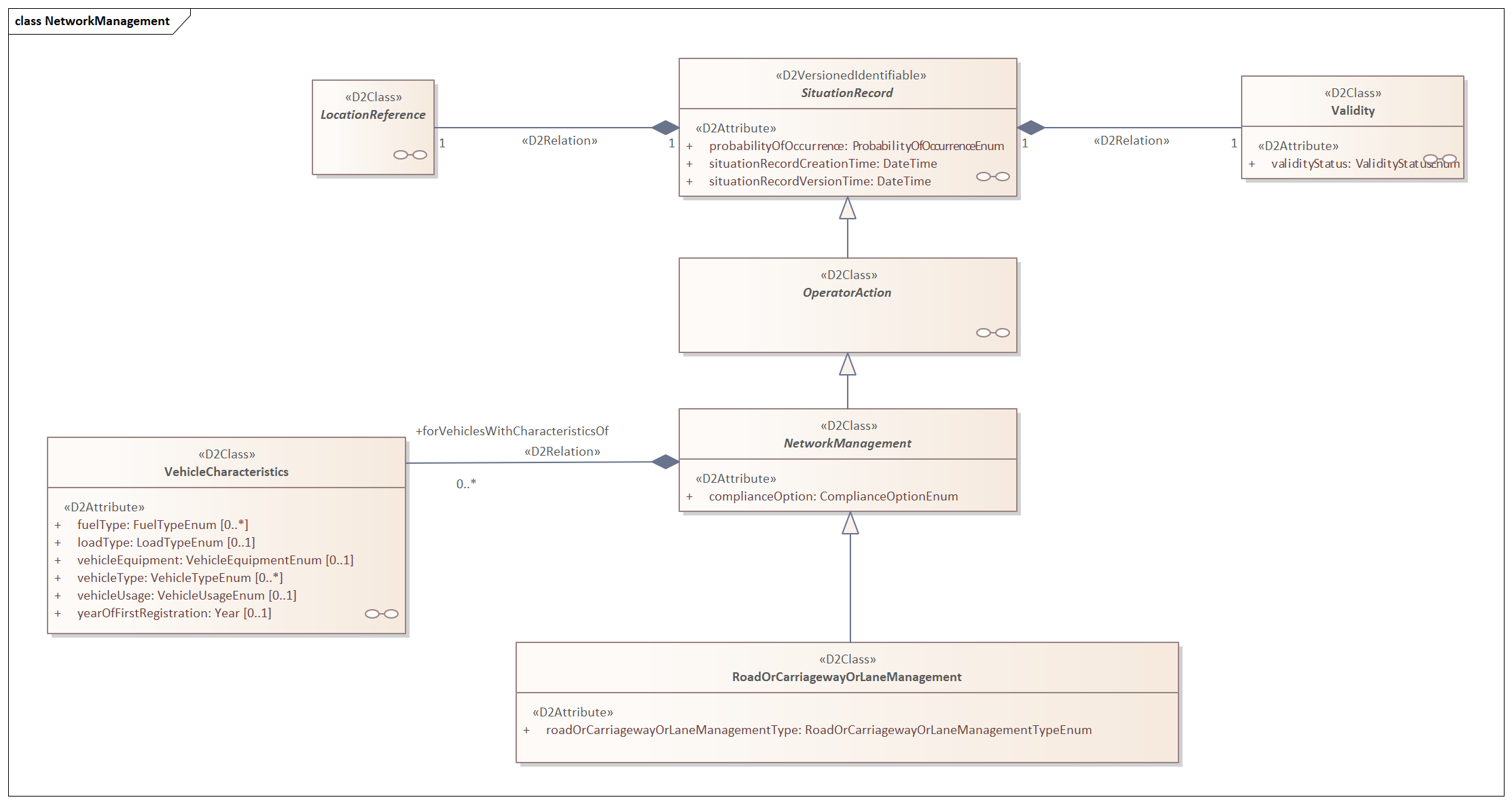DATEX II packages addressed by the RRP Road Closures
DATEX II packages addressed by the RRP Road Closures¶
This RRP (Recommended Reference Profile) tailors the following DATEX II model packages:
- Common – commonly used DATEX II data elements used by the tailored packages below (CEN/EN 16157-7:2018)
- LocationReferencing – the location references, tailored for road closure information (CEN/EN 161578-2: 2019)
- Situation – the DATEX II general traffic event packages tailored for road closure information (CEN/EN 16157-3:2018)
The Situation package is used for publishing event-type information for road closures as a SituationPublication.
Instances of OperatorAction -> NetworkManagement -> RoadOrCarriagewayOrLaneManagement contain roadOrCarriagewayOrLaneManagementType, see Figure 1.
Figure 1 RoadOrCarriagewayOrLaneManagement
The available closuretypes in this RRP are:
- carriagewayClosures
- roadClosed
- rollingRoadBlock
LocationReference profile¶
This RRP does not specify the locationreferencing methods to use. The applied method for location referencing is the choice of the specific user implementing this profile.
This RRP does limit the use of SupplementaryPositionalDescription to identifying the carriageway that is closed. For drivers on roads with separated carriageways (either for different directions, but for parallel structures as well), a road closure is related to the availability of the specific carriageway.
Validity profile¶
The time validity profile includes the overallPeriod and validPeriod concepts. In case of long-term closures or because of traffic management purposes, controlled accessibility the following concepts are available as well:
- recurringTimeperiodOfDay
- recurringDayWeekMonthPeriod
PayloadPublication and SituationPublication profile¶
The general ‘wrapper’ classes for conveying event information are the following classes:
- PayloadPublication: The generic base class for all DATEX II publications. The optional attributes of the class PayloadPublication have all been kept in the RRP, since they are very generic by nature may be useful
- SituationPublication: This is a container class and has no extra attributes
Situation profile¶
Traffic Situations are in DATEX II modelled as a container class (Situation) that contains SituationRecords, the basic elements to describe an event of a certain nature. The following profile applies:
- Situation: The optional attributes and associated components of the class Situation have all been kept in the RRP, since they are very generic by nature;
- From the generic data concepts supported by any kind of SituationRecord, the following have been deselected since they are not strictly required to provide the information in this data-category:
- cause
- informationManagerOverride
- confidentialityOverride
Application of the RRP¶
The RRP can be selected in the schema creation wizard at DATEX II webtool.
- If you want to implement the RRP “as-is”, you simply click through the wizard starting with the default selection of the package in the first step.
You skip Step 2
Choose the respective RRP in Step 3.
In step 4 you select the locationreferencing method you are going to implement.
Then you skip the subsequent steps and choose which type of output (XML Schema or JSON Schema) you want to produce in Step 6.
These schemas will then be used by the implementer of you RRP to create the interface software, e.g. by application of data binding.
If you service manages more data elements which have not been selected in the RRP, it is possible to extend the profile in Step 5 by selecting further elements.
